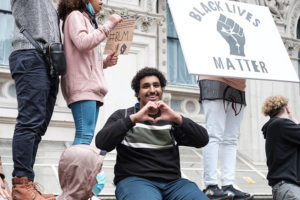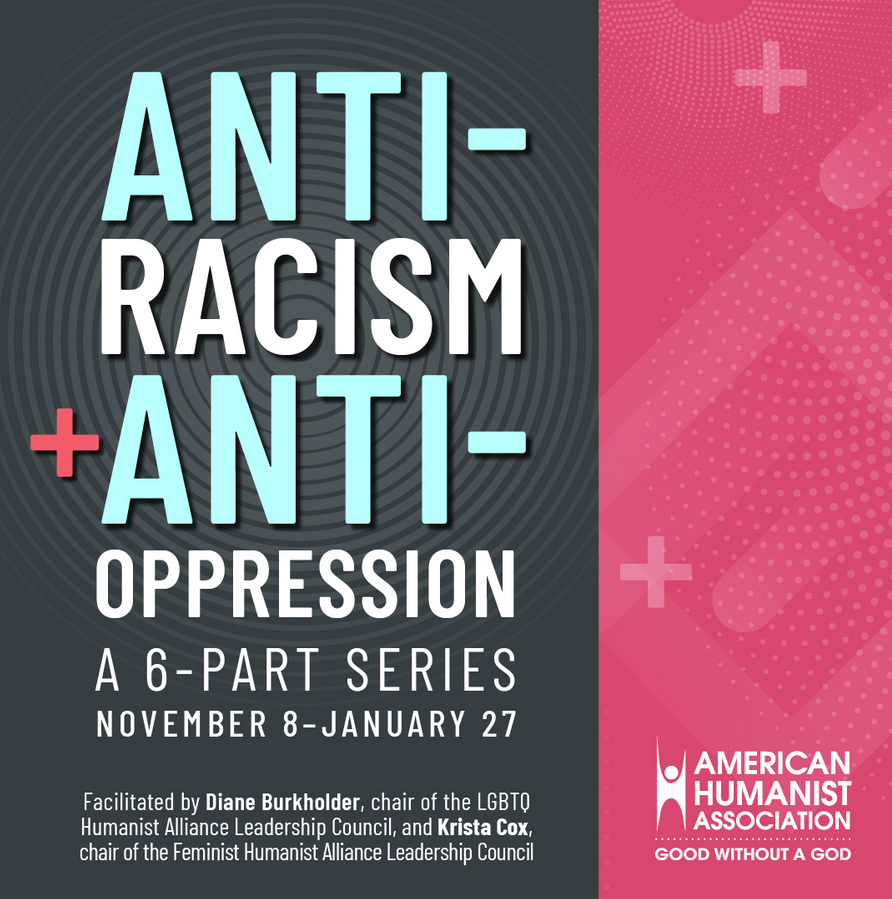Bringing Anti-Racist Tools and Spaces to Our Humanist Community
 Photo by Ehimetalor Akhere Unuabona on Unsplash
Photo by Ehimetalor Akhere Unuabona on Unsplash Another Black man was killed by police in Pennsylvania this week. His name was Walter Wallace, Jr. While his family grieves, millions of people around the country are feeling too-familiar feelings because yet another Black man was killed in America.
As humanists, we see the evidence of systemic racism and systems of oppression. We connect the dots between murder in Philadelphia and mental health crises. We connect the dots between voter suppression and civil rights. We connect the dots between wealth inequality and education.
Though as humanists, we don’t just connect dots—we act. But what can we do to make a difference? How do those of us who are most impacted by white supremacy survive it? While white supremacy is being lauded by those at the center of power and our own communities certainly have high hurdles to overcome on the issue, sometimes we may feel powerless.
To combat that and to proactively move us forward, the American Humanist Association (AHA) is launching a six-part anti-racism and anti-oppression workshop series for humanists around the country. Diane Burkholder, chair of the LGBTQ Humanist Alliance, and Krista Cox, chair of the Feminist Humanist Alliance have put together a thoughtful and much-needed calendar of events that will help us do this work individually, within our humanist communities, and out in the world.
This series offers illumination of the insidious and often invisible ways white supremacy operates in our society, and practical tools for both surviving and dismantling it within the context of nontheist spaces.
 The first session importantly focuses on the needs and experiences of Black people, Indigenous people, and people of color (BIPOC). Less than a week after the election—and as we continue to endure the multiple hardships of 2020—genuinely safe, healing spaces become paramount for the health and wellbeing of BIPOC. This session will help participants understand the value of dedicated non-white and secular spaces, teach participants to hold space and provide resources to help you stay well, and it will include a listening space where folks can share and be supported.
The first session importantly focuses on the needs and experiences of Black people, Indigenous people, and people of color (BIPOC). Less than a week after the election—and as we continue to endure the multiple hardships of 2020—genuinely safe, healing spaces become paramount for the health and wellbeing of BIPOC. This session will help participants understand the value of dedicated non-white and secular spaces, teach participants to hold space and provide resources to help you stay well, and it will include a listening space where folks can share and be supported.
The remaining five sessions, open to all humanists and nontheists, will provide breakout groups to tailor the session to different demographics and will address everything from pushing back against the whitewashing of black movements to creating inclusive humanist communities.
Participants are encouraged to attend multiple sessions and while there is a recommended price of $15 per session, there is a pay-what-you-can option and no one will be turned away for lack of funds.
Sessions include:
Sanctuary: The Importance of Non-White Spaces (and How to Create Them)
November 8th, 2020, 3:00 pm – 4:30 pm ET
This session centers Black Indigenous and other People of Color (BIPOC) attendees
Losing Your Religion (but not its Baggage): Religion and White Supremacy Culture
November 22nd, 2020, 3:00 pm to 5:00 pm ET
Come to Jesus: Moving from Ally to Accomplice
December 2nd, 2020, 6:30 pm to 8:00 pm ET
Secular Celebration: Communion, Ritual, and Fellowship
December 16th, 2020, 6:30 pm to 8:30 pm ET
Bless Your Heart: Moving Beyond the White Moderate
January 10th, 2021, 6:30 pm to 8:00 pm ET
Better than Moses: Leadership without all the Wandering
January 27th, 2021, 6:30 pm to 8:30 pm ET
To learn more about individual sessions and to register, visit our website. We may be in a crisis, but there are paths toward a solution. We must build a better and more humanistic country moving forward, and this series will give humanists the tools and community-centered care to make it a reality. Please join us.
